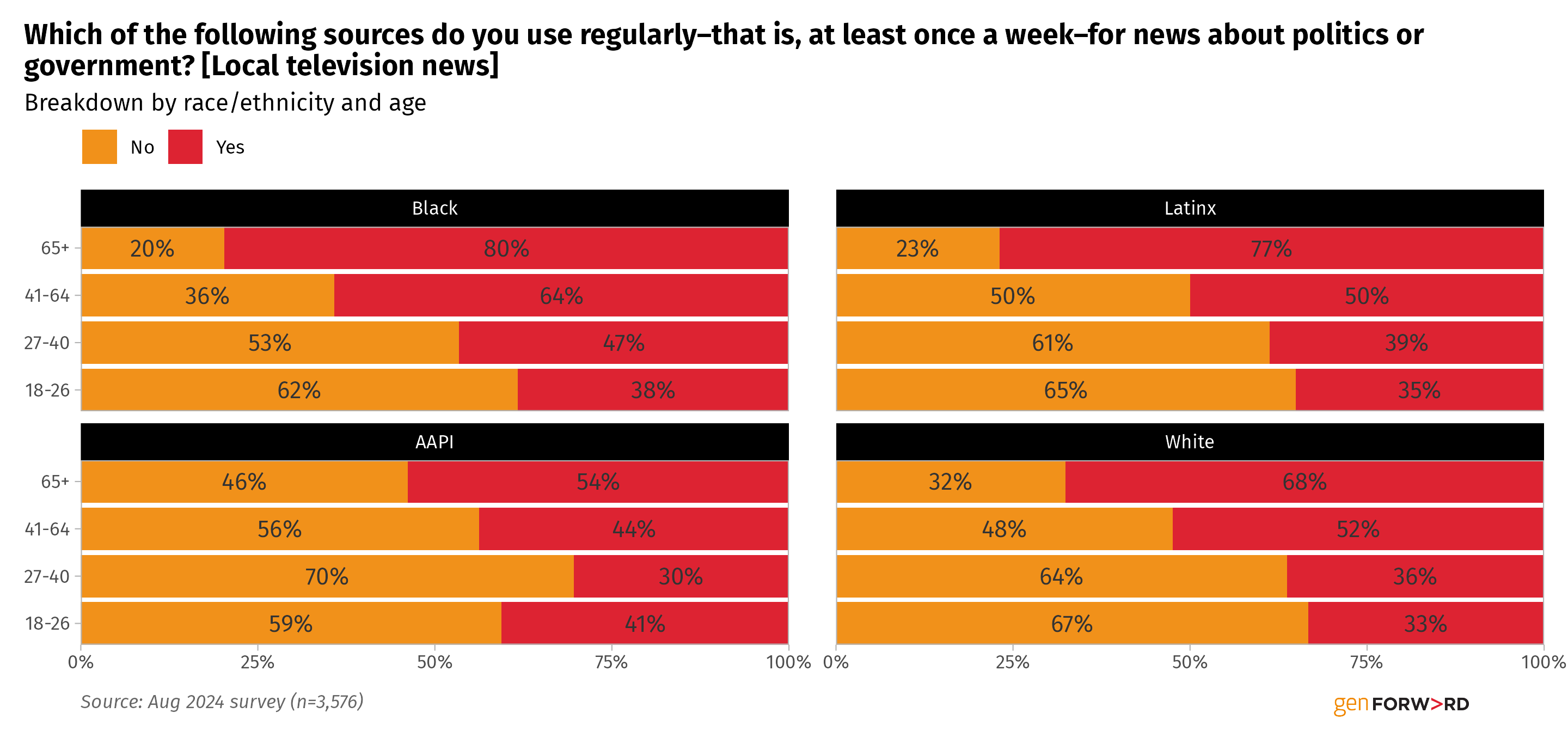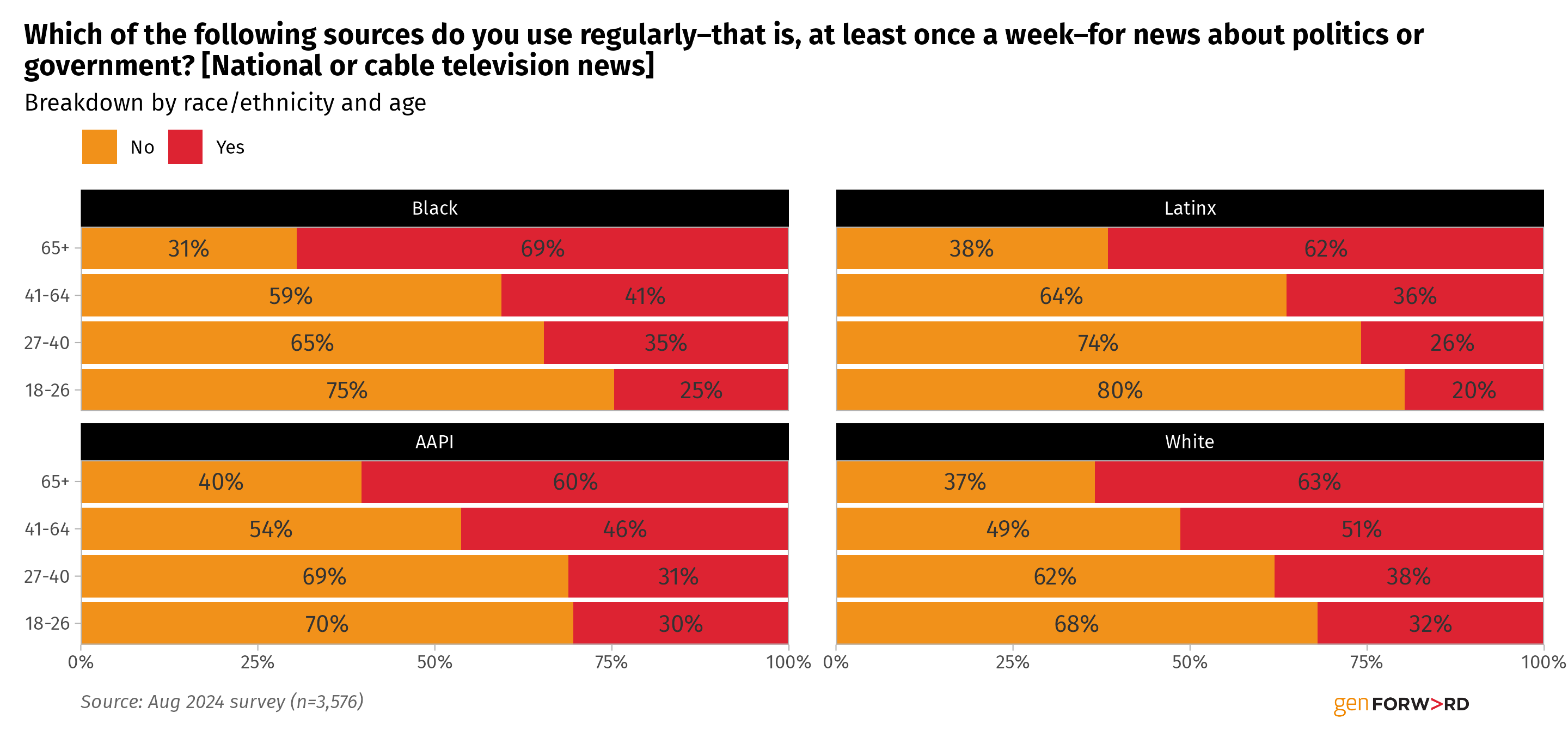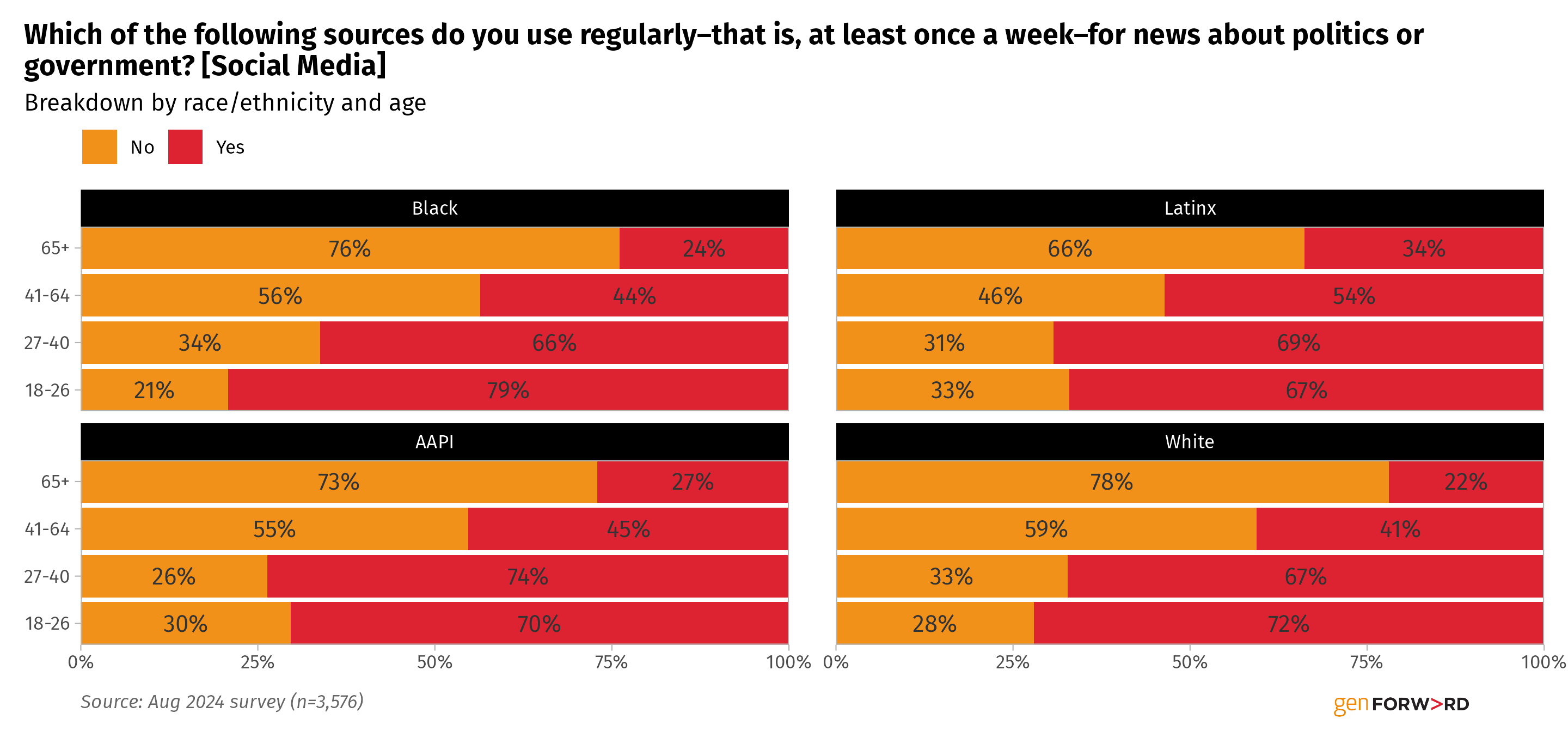By Jenn M. Jackson
October 2, 2024
In recent years, many political commentators and educators have publicly begrudged the pervasiveness of social media and its potential to dampen political knowledge. During critical moments, like major presidential election cycles, many in the mass public express concerns about how young Americans acquire political knowledge and the risks of relying on news that has not been thoroughly vetted or fact-checked. In many ways, the inescapability of social media platforms like X (formerly known as Twitter), Facebook, Instagram, and TikTok has created an environment where the generational gap in news media consumption poses serious concerns about political knowledge and attitudes.
Why does it matter where people get their news from? Data from Pew Research from the 2020 election cycle has shown that people who consume news from social media are less knowledgeable about politics and less engaged overall. These Americans, they revealed, were also more likely to be under thirty years old. The reliance on social media for news about politics and government represents a potential threat to the young people’s exposure to factual knowledge about the political world. It may also limit the general knowledge they acquire about the way the United States political system functions. Importantly, many of these studies rely on conservative notions of political knowledge that privilege certain types of information (e.g. knowledge of the U.S. Constitution, names of U.S. Senators, etc.) over other community-centered knowledge. In many cases, these types of knowledge receive greater attention in mass media because of the deprioritization of communal knowledge.
But, general political knowledge is critical. This is knowledge regarding how presidents are elected, how votes are cast, how bills are passed, and how the United States Congress functions. In critical social movement moments, like in the struggle for torture justice Chicago and the #ByeAnita campaign in 2016, to remove Anita Alvarez from office after mishandling the police killing of LaQuan McDonald, general political knowledge was necessary in navigating complex social systems to ensure political change.
The possession of general political knowledge could also be a competitive edge for young people. In a recent interview with Angela Rye on “The Breakfast Club,” Green Party presidential candidate Jill Stein showed how little many people know about these fundamental political processes. When Rye asked Stein how many members there were in the House of Representatives, she answered, “How many total are there? What is it, 600, some number?” The fact that a current candidate for POTUS struggled with this question suggests that concerns about general political knowledge amongst those in the public at-large are legitimate.
Three main news sources have remained important to American citizens: local news, cable news, and social media. Local and cable news have frequently been measured as more accurate than local newspapers. Though, cable news outlets like Fox News, MSNBC, and CNN have grown more polarized in recent years. Although many local and national news sources have online platforms, the pervasiveness of fake news has made social media a complex and unreliable place for factual information about the United States political system. But, it isn’t clear that any of these potential pitfalls of using these sources for news media have deterred most viewers.

While national and cable news networks like CNN, Fox News, and MSNBC have been central to the media campaigns of major party candidates for decades, they have not often resonated with younger voters. With such high political stakes this election season, some might wonder how interest in these news outlets may have changed over time. However, cable and national news media consumption amongst Americans we surveyed reflected much the same patterns as local news media. Sixty-nine percent of Black Americans we polled over the age of sixty-five years old reported relying on cable or national news outlets at least once per week. But, only twenty-five percent of young Black Americans between the ages of eighteen and twenty-six shared that sentiment.
Across racial identity, consumption of cable and national news media mirrored that of local news media, with young Americans of all racial groups being the least likely to engage in these media sources when compared to older Americans we surveyed. While there is no certainty that these news outlets are consistently accurate (in fact, they are all inherently biased), they do contribute to basic factual knowledge about the American political system and the issues facing voters.

In stark contrast with their local television and cable news consumption, Americans we polled were much more likely to rely on social media for news about politics or government if they were younger. Seventy-nine percent of Black Americans between the ages of eighteen and twenty-six used social media regularly for news about politics or government at least once per week. For Latinx and AAPI respondents in this age group, those rates were sixty-seven and seventy percent, respectively. And, for white Americans in this cohort, it was seventy-two percent. That means that more than two-thirds of each racial group in this cohort uses social media as the primary source for their political news.

For Black Americans between twenty-seven to forty years old, sixty-six percent used social media for news about politics or government at least once per week. For AAPI and Latinx Americans in this age group, their rates were seventy-four and sixty-nine percent, respectively. For white Americans in this age cohort, seventy-two percent of them reported engaging in social media consumption at least once per week for political news. This means that, for all racial demographics between 18 and 40, social media remains the central news source in their political media consumption ecosystem.
These findings suggest that media consumption behaviors from 2020 have remained largely unchanged. While it isn’t clear yet how these behaviors will affect the upcoming election, it does raise important concerns about how to ensure that younger generations of voters have access to high quality political news on media platforms that they regularly visit.
As media platforms like X (formerly known as Twitter) and TikTok remain under threat by powerful political forces seeking to leverage access to millions of users and shape public opinion in the process, journalists, educators, and researchers will need to find alternative strategies to mobilize young voters seeking high quality, factual political information.
The GenForward Survey is associated with the University of Chicago. May 2024 responses were collected from May 10th, 2024, through May 22nd, 2024, among a nationally-representative sample of 2,089 young adults between the ages of 18-40 in the United States. The overall margin of error is ±3.24 percentage points at the 95 percent confidence level.
Jenn M. Jackson (they/them) is a queer androgynous Black woman, an abolitionist, a lover of all Black people, and an Assistant Professor at Syracuse University in the Department of Political Science. Jackson’s book, Black Women Taught Us, is a critical analysis of why Black women’s women’s freedom fighting has been so overlooked throughout history. Jackson’s research is in Black Politics with a focus on group threat, gender and sexuality, political behavior, and social movements. Jackson is a columnist at Teen Vogue, the author of peer-reviewed articles at Public Culture, Politics, Groups, and Identities, and the Journal of Women, Politics, and Policy, and the author of several forthcoming book chapters on the intersections of race, gender, class, and politics. Jackson received their doctoral degree in Political Science at the University of Chicago in 2019. Learn more about Jenn & the GenForward researchers here.

